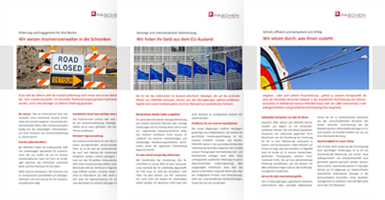律所要闻 / 條目
European Parliament favours EU late payment regulation
At the meeting of the EU Internal Market Committee IMCO on 20 March 2024, a joint REPORT on the EU Commission’s proposal for a late payment regulation from September 2023 to combat late payment in commercial transactions was agreed. Fortunately, the clear criticism from the member states had already had an effect. Particularly noteworthy was the stipulation of the general permissibility of up to 60 days’ payment terms in the B2B sector, subject to prior agreement, and even up to 120 days for seasonal items and products with a low turnover of goods, whereby specific product groups are to be stipulated.
Update April 2024
On 23 April 2024, the topic was now on the agenda of the EU Parliament in Strasbourg. A vote was held on a slightly modified draft, which was adopted by a majority at first reading.
Full resolution European Parliament legislative resolution of 23 April 2024 on the proposal for a regulation of the European Parliament and of the Council on combating late payment in commercial transactions (COM(2023)0533 – C9-0338/2023 – 2023/0323(COD))
The most important changes in the adopted version are as follows:
Article 3(4a) (new): In order to improve the payment practice of public bodies towards businesses (G2B), it is now provided that, upon application to the public body that owes the amount due, it is possible to offset the amount due against outstanding amounts owed by the creditor to the same public body.
Article 5(3): The prohibition on waiving interest on arrears should now only apply if the debtor is not a public body or a large enterprise.
Article 8(1): According to the revised version, the debtor should be obliged to pay compensation for recovery costs, which is staggered as follows:
- EUR 50 for each individual transaction with a value of up to EUR 1,500,
- EUR 100 for each individual transaction with a value of between EUR 1,500 and EUR 15,000
- EUR 150 for each individual transaction above EUR 15,000
Article 8(3): If the debtor is a public body or a large company, the creditor should not be able to waive his right to the lump sum compensation.
Article 9: Restrictions on the ‘assignment of credit’ to obtain financing from banks or factoring companies and on ‘recourse to a court order for payment’ should now be ineffective throughout the EU.
Article 12: For uncontested pecuniary claims, the current text aims to ensure that creditors receive an enforceable title within 60 calendar days of filing the action or application with a court or other competent authority.
Article 14(1): According to the amended version, the enforcement authorities to be set up on a mandatory basis are to be given the power to determine infringements of the Regulation and to oblige the debtor to pay default interest and/or compensation to the creditor.
Article 19: For self-employed persons and micro-enterprises as debtors, the regulation should only apply 24 months after entry into force, for all others 18 months after entry into force in accordance with Article 20
Assessment of the current status
Despite the improvements that have been made, the adopted text still shows little practical expertise on the part of the EU parliamentarians. Although the authors, with their comments on the prohibition of assignment in connection with financing issues, have probably finally recognised that their plan will have a significant impact on corporate financing, the text of the regulation still ignores the serious consequences for one of the most important financing instruments for the very companies that the regulation is intended to help: supplier credit.
Furthermore, the justified criticism from the business community of completely excessive bureaucracy still does not seem to have been taken on board if, for no apparent reason, the obligation to set up a new enforcement authority for the Member States is created, even though the tasks intended for this authority, in particular with regard to default interest and recovery costs, are already carried out by the courts and are in good hands there.
However, as the final adoption of the regulation can only take place after the European elections in June 2024 by the newly constituted Parliament, there is still hope for further negotiations, improvements or even a complete cancellation.
We will keep you informed.
Further information can be found in our top topic Planned EU late payment regulation under fierce fire


